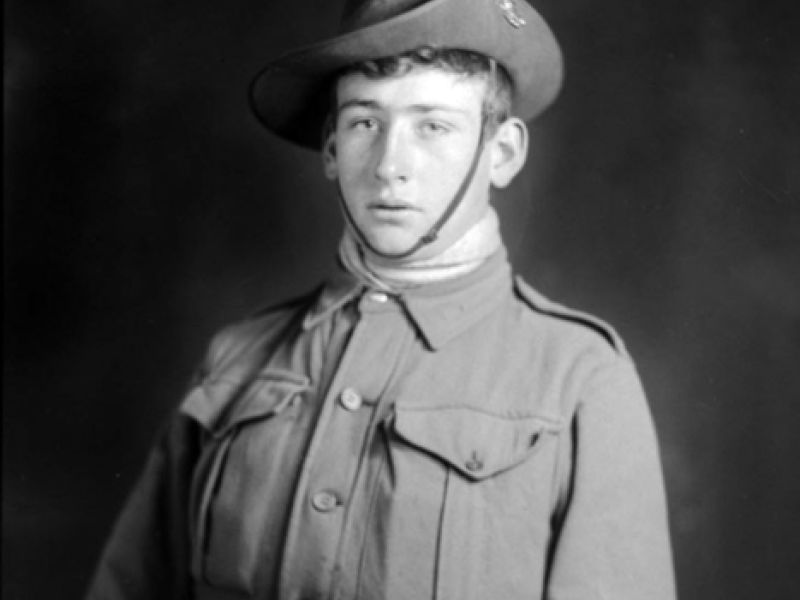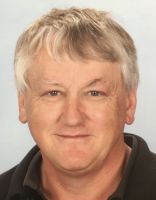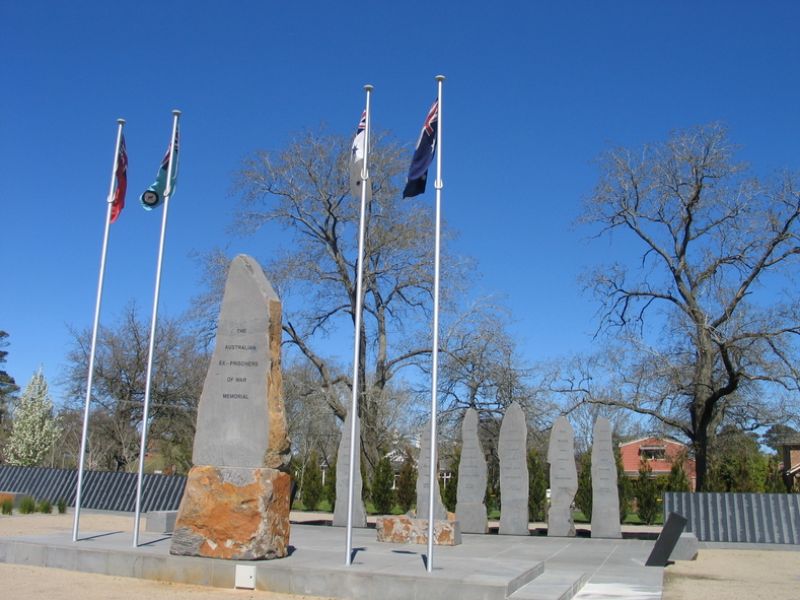Percival Edward Smith
Percival was born on the 17th of August 1897 at Blind Creek, Mitta Mitta, Victoria. He was the youngest of seven children of Matthew Charles and Elizabeth Agnes (née Styles). Three of these children would die before Percy was born. Two of these, twins James and George, would die in a house fire while Elizabeth was out herding cattle and Matthew was away working. Percy’s mother would die in 1910 when he was only three years-old. His father remarried soon after and with his new wife, Edith Norman, would add to the family. Percy attended the Scrubby Creek State School. In 1913, Percy was living at St Mark’s in Wodonga and working as a clerk.
Percy was only 18 when he enlisted at Eskdale in Victoria. Amongst his records is a letter from his father indicating that he gave his son permission to enlist. On the 29th of June 1915, Percy signed his enlistment papers. He was alloted the Regimental Number 4774 and placed in the 10th Reinforcements for the 22nd Battalion. After some initial training he embarked from Melbourne on board HMAT A18 Wiltshire on the 7th March 1916.
On the 29th of March the Wiltshire put into port, most likely Colombo, Ceylon (now Sri Lanka). Shore leave was often given at some ports and Percy was able to go ashore and stretch his legs. Unfortunately, according to someone, he was improperly dressed (although his records don’t state how he was improperly dressed). He was charged and made to forfeit two days pay. The 10th Reinforcements spent sometime in Egypt waiting for a ship that would take them to France by way of the Mediterranean. On the 30th of May he boarded the SS Tunisian and found himself in France five days later after a smooth passage.
The reinforcements joined the battalion on the 31st of July 1916. It wasn’t long before before had his first experience at Pozieres. The 2nd Australian Division, of which the 22nd Battalion was part of, had taken the village of Pozieres by the 27th of July. It was then ordered to attack and capture the heights above the village. During the six weeks that this battle took place the AIF lost more men than it did over the eight months it spent at Gallipoli. During the 22nd Battalion’s actions on the 5th of August Percy was wounded with a gunshot wound to his left elbow. He wound not rejoin his unit until the 24th of September 1916.
Percy had been back less than three weeks when he was admitted to hospital suffering from scabies. Reoccuring bouts of this would keep him in and out of hospital until the 8th of January 1917. Back with the battalion where it was resting at Becourt Wood Camp near Fricourt, Percy settle into a routine of training. It didn’t last long. On the 3rd of February while practicing with the Mills bomb hand grenade he was accidently wounded in the face. Percy was back in hospital for two weeks.
Three kilometres west of the village of Dernacourt was the hamlet of Ville-sur-Ancre. It was decided that in order to straighten the line this small village needed to captured. The operation was thoroughly planned. The Australians passed pincer movements around the north and south sides of the hamlet then radining parties were sent it to clear the place. Although Australian casualties measured 418, German loses included 330 prisoners and 45 machine-guns captured. During the battle, Percy showed that even though he was only 20, he was a leader and was awarded a Military Medal for his actions.
The citation for the medal stated;
“For conspicuous gallantry and devotion to duty during the attack on Ville-Sur-Ancre on the morning of 19.5.18. This man, on discovering that his platoon commander and sergeant had both been wounded, took charge of the platoon and led it in the most dashing manner to the objective. There he reorganised the men and carried out the work of consolidation. He kept his company commander well posted as to the situation and engaged enemy movement on our front preventing them from launching counter attack. His leadership and initiative under fire were most marked.”
Lieutenent-General Monash’s plans for the August 1918 offensive involved four of his five Australian Divisions leap-frogging each other as each objective was taken. These actions saw the battalions drastically reduced in numbers. The battalion was ordered to attack the village of Hervilleon the 18th of August. So depleted was its fighting strength that the three attacking companies could only muster 90 rifles between them for the attack. A full strength company could usually muster over 120 rifles. The day did not go well for the Australians. Of the 90 men that took part in the attack of the 22nd Battalion, 60 were killed, wounded, missing or taken prisoner. Percy was initially listed as being missing in action but, later in the day, was reported as being a prisoner of war. Hewas eventually taken to the Belgium city of Namur.
Percy’s Red Cross Society file described what happened to him;
“DIED AS A PRISONER OF WAR
He was captured with me 18/8/18 - We moved from camp to camp as the British advanced till we got to No 4 fort at Namur - Smith was about 14 days there - I was 11 days. He followed me to some barracks at Namur, and went into hospital about 5th November. He couldn’t eat the food, and the german doctor told him he had an abscess in the throat - I think the bad living conditions in the fort had given him diphtheria - and he was in a starved condition. We had only German food, being in occupied territory and moving about got no Red Cross parcels. He died in the Namur prisoners hospital, but I could ever find out exactly which and know nothing of his burial. He had an MM. He left no message when he went to hospital.
Cert. by 1738 W.H.T. Jewell, 22nd Battn. Repatriated prisoner of war. 6/1/19”
Percy has no known grave. He is remembered on the Australian War Memorial Roll of Honour, the Australian Ex-Prisoners of War memorial in Ballarat, the Villers-Bretonneux Memorial (Australian National Memorial - France), and the Towong Shire Boer War and WW1 Roll of Honour. For his service during the First World War, he was awarded the British War Medal and the Victory Medal.

 Stephen Learmonth
Stephen Learmonth